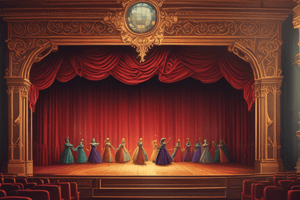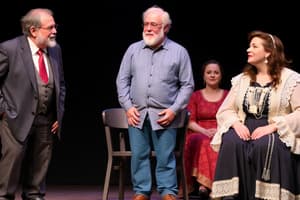Podcast
Questions and Answers
What is the primary characteristic of a melodrama?
What is the primary characteristic of a melodrama?
- A satirical tone with a happy ending
- A tragic ending with a hero who fails to achieve their goals
- A focus on the protagonist's character development
- Sensational actions, extravagant emotions, and a happy ending (correct)
What is the main difference between a tragicomedy and a comedy?
What is the main difference between a tragicomedy and a comedy?
- The tone of the hero's failure
- The combination of tragedy and comedy elements (correct)
- The hero's success in achieving their goals
- The presence of satire in the drama
What type of drama is characterized by its satirical tone and ridicule of the hero?
What type of drama is characterized by its satirical tone and ridicule of the hero?
- Romantic comedy
- Comedy of manners
- Tragicomedy
- Farce (correct)
What is the primary purpose of a religious play?
What is the primary purpose of a religious play?
What is the defining feature of a comedy of manners?
What is the defining feature of a comedy of manners?
What is the common thread among 'John en Marsha', 'Facifica Falayfay', and 'Tatay Nick'?
What is the common thread among 'John en Marsha', 'Facifica Falayfay', and 'Tatay Nick'?
What type of drama is characterized by its focus on the action or situation rather than the protagonist?
What type of drama is characterized by its focus on the action or situation rather than the protagonist?
What is the purpose of a historical play?
What is the purpose of a historical play?
What is the tone of a farce?
What is the tone of a farce?
What is the defining feature of a tragicomedy?
What is the defining feature of a tragicomedy?
Flashcards are hidden until you start studying
Study Notes
Elements of Play Production
- Literary elements, direction, acting, editing, set design, production design, cinematography, costume design, make-up, properties, light or lighting effects, and sound effects are the key elements of play production.
Literary Elements
- Literary elements are the elements of drama as a literary art.
- They are the foundation of the play.
Direction
- The director is in charge of the dramatic performance.
- He instructs the actors and all the people involved in the production.
- He is always present from the preproduction stage to the post-production of the play.
Acting
- The members of the cast perform the roles assigned to them by the director.
- They read the script, memorize their lines, follow the instructions given by the director, and give justice to their assigned roles.
Editing
- The editor sequences the scenes to be presented in a coherent whole.
- He takes out unnecessary scenes, particularly the obscene and offensive ones.
Set Design
- The set designer does the layout of the set.
- He determines what to place as backdrop and what to put on stage.
- Set designs are classified into realistic, abstract, suggestive, or functional.
Cinematography
- The cinematographer takes charge of the photography.
- He looks for a location that fits the story and shoots the scenes forming part of the drama.
Production Design
- The production designer is tasked to do the overall design for a drama to be shown on the small screen or the wide screen.
- He has a bigger responsibility than a set designer because his work covers an area as wide as a small community or a large province.
- At times, his work involves designing costumes, determining the props to be used, and collaborating with the cinematographer.
Costume Design
- The costume designer creates the clothes to be worn by the actors and actresses.
- He sees to it that the costumes suit the characters to be portrayed by the performers.
Make-Up
- The make-up artist beautifies or uglifies the actors and actresses based on the roles they portray.
- Make-up is made up of body paints and paddings.
Properties
- The properties (props for short) are the things which the actors and actresses carry or bring with them as they perform on stage or in front of the camera.
- They are used to establish their characters.
Light/Lighting Effects
- The lights man is in charge of determining the amount and the sources of light needed to make scenes realistic and credible.
Kinds of Drama
- Tragedy: a drama in which the hero fails to fulfill his goal or goals due to his tragic flaw.
- Comedy: a drama in which the hero succeeds in fulfilling his goal or goals.
- Tragicomedy: a drama in which the hero fails with respect to some goals but succeeds with respect to the other goals.
- Farce: a drama written to poke fun at the hero.
- Melodrama: a drama that focuses on the action or the situation, characterized by a sentimental love story, sensational actions, extravagant emotions, and a happy ending.
- Religious Play: a drama that serves to reenact a biblical event or to teach a truth or truths pertaining to a certain religion.
- Historical Play: a drama that serves to reenact a historical event that plays an important role on the lives of the viewers.
Studying That Suits You
Use AI to generate personalized quizzes and flashcards to suit your learning preferences.




